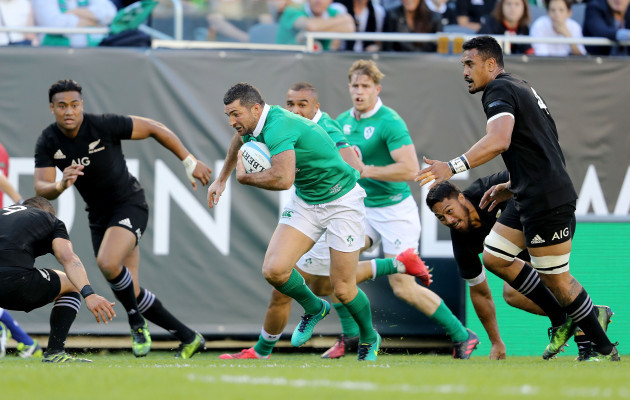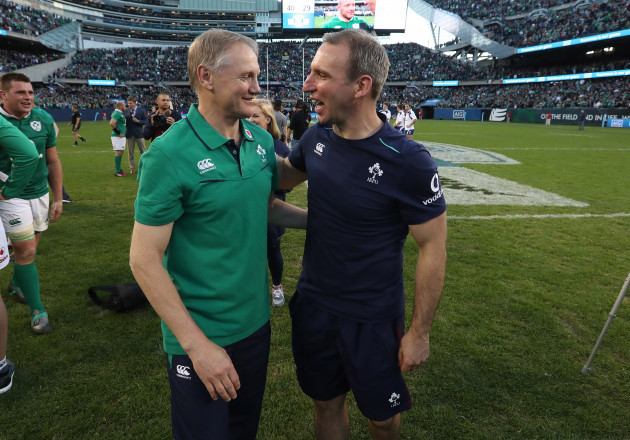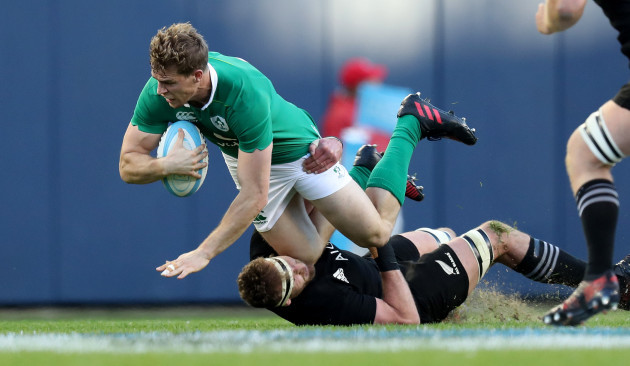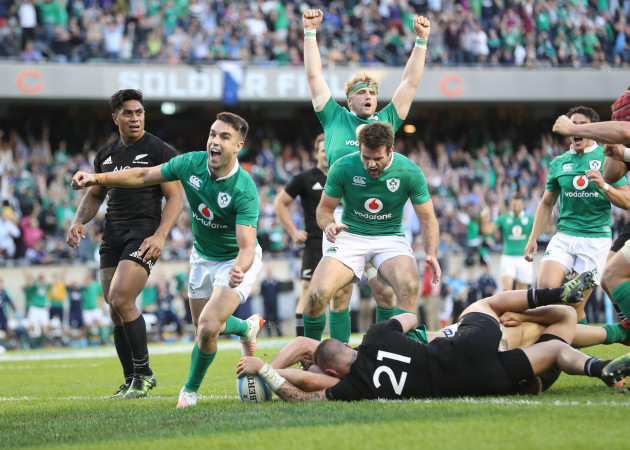SO HERE HE comes, this unlikely hero, a Gael force in the windy city. Black stubble and an intense glare on his face. He looks unhappy but will later say how deep, personal and satisfying this day has been.
Reporters crowd around him in this concrete underpass that circulates Soldier Field. Light is fading outside; inside the player tells us his head was in ‘a dark place’. He’d lost form. This was some place to find it.
Chicago. November, 2016. Five years ago this month, the first time Ireland had ever beaten the All Blacks, a triumph of will as well as tactical nous, but most of all a triumph of the mind.
Until then, Ireland had always found a way to lose to New Zealand. This time they discovered how to win.
- See sport differently with The42 Membership and get closer to the stories that matter with exclusive analysis, insight and debate. Click here to find out more>
All around the city that night, green jerseys were visible, Irish accents audible. Getting out of a taxi a quartet of young men, aged in their early 30s, were having a swift and robust debate about whether they should walk from Clark Street to Michigan Avenue.
“Ah, f*** it,” one of them said. “What is the point walking? The Celtic Tiger’s back, baby. Jump back into that taxi.”
This was also the day they jumped on the rugby bandwagon. Soldier Field, a towering stadium, gradually filled with green shirts and tricolours before kick-off and when the final whistle blew, there was this unforgettable roar, a bit like the one by Mel Gibson’s character, William Wallace, at the end of Braveheart, only multiplied by 62,300.
The story of that day gets told here but from a different perspective. The player whose head was in a dark place was Rob Kearney. It was only 48 hours earlier that he’d questioned himself. He was in a corner of a hotel lobby at the time. A man called Donald Trump had built the gaff.
Now while it’s highly unlikely The Donald was thinking about 111-year-waits or full-backs losing form when he decided to place Trump Towers in that part of downtown Chicago, the laugh is that The Donald had a walk-on role to play in Ireland’s win over New Zealand five years ago.
Kearney wasn’t thinking about any of that when he sat down for coffee in Trump’s hotel. He was thinking about ‘finding a spark’. The fella sitting opposite was about to tell him where it was hidden.
HE WAS BORN in Mullaghbawn, south Armagh, 44 years ago, an unlikely starting point for a man who’d help down the All Blacks.
As a child he was a Gaelic football fanatic, a trait that would stay with him through his teens and into his early 20s. After turning 25, he was an All-Ireland winner, a corner-back on the Armagh team that defeated Kerry in the 2002 final.
At the same time he was entering the GAA’s history books, Enda McNulty was getting his head stuck into his psychology books. He’d graduate from Queen’s with First Class Honours but it was the advice of a wise old fireman from a different Queens that would prove the unlikeliest of inspirations for an Ireland win in Soldier Field.
Most of you won’t have heard of Dessie Ryan. He’s well into the autumn of his life now but when it was spring, he was a champion, winning National League titles with New York GAA in the 1960s, heading up the fire department in the New York borough of Queens where life and death were daily aspects of his job spec.
By the ‘90s he was back home, retired from work, not from football. “The most knowledgeable GAA man I’ve ever met,” was Eamon Coleman’s description of Ryan. Coleman, in case you need reminding, managed Derry to their only All-Ireland title in 1993. Six years later, Ryan was passing on his football knowledge to someone else, McNulty.
“But he is so much more than a football coach,” says McNulty, the Irish rugby team’s sports psychologist up until 2019. “He moulds people, inspires them.” It was Ryan who McNulty turned to six weeks out from the All Blacks game. “Dessie, I’m meeting Joe Schmidt in three days’ time,” McNulty said to him. “This is what I’m thinking of saying.”
Ryan listened; Ryan probed; Ryan more or less impersonated Schmidt without mimicking the New Zealander’s accent. He wasn’t just a sounding board to an old pupil, much more like an audio book inserted into McNulty’s head, offering solid, practical advice, diluting the mumbo-jumbo stuff he’d read in textbooks, articulating plans and strategies in simple, plain language. “Dessie taught us all how to be leaders, how to be men, how to integrate mental toughness into our everyday work.”
By the time McNulty and Schmidt sat down for coffee, the Armagh man knew what he had to say. By the time they landed in Chicago, though, there was something much bigger than a game of rugby to think about.
AXEL
ANTHONY FOLEY HAD passed away just three weeks prior to the Ireland-New Zealand game and as the memories came crowding in, as the world selfishly continued on its way, it was clear that the rugby players who knew him simply had to acknowledge their friend, coach, mentor, in a memorable and respectful way.
Greg Feek could sense it. A friend of Foley’s, the then-Ireland scrum coach, has a creative mind. Feek’s a New Zealander. He had performed the haka as a player, faced it as a coach. He knew its symbolism and its power but also knew this deep, emotional reservoir building within his own squad.
The weekend before Ireland travelled to Chicago, he gathered his children and their friends in his back garden and positioned them in a certain way so that they’d resemble the figure eight; Foley’s number. Once he’d mastered it, he quickly ran to an upstairs window and looked down. “Yes, perfect,” he thought to himself. “That’ll work.”
Quietly he spoke to Schmidt to explain his idea. The coach was in favour, so too the backroom staff, and most crucially of all, the players. Still, after a messy enough week where the Ireland team had to cross the Atlantic and then make the most of a limited training facility in Chicago, there was only a small time period to practice the line-up, before the actual haka.
“You didn’t want to go into a match where it looked like two circles,” says McNulty. “It was choreographed. Everyone bought into it. We all knew the symbolism of it.”
So did the entire crowd. Normally, when the haka begins, there’s a mawkish outburst from the stands as people get over-excited. This time there was a hush, people’s eyes diverting from the New Zealand war dance to the unconventional way the Ireland players had lined up.
“The haka gets New Zealand players physiologically aroused, psychologically set,” says McNulty.
“By the end of it, emotionally they are ready for battle. Meanwhile the opponent is obliged to stand and look at them.”
This time it was different. “Ireland weren’t worried about the All Blacks. They were thinking about this amazing character in Axel. They were remembering his spirit, his power, his fortitude and resilience and what he meant to all of them.
“So they nullified the haka. The haka was irrelevant. It was as if we put up our shield against the haka, not only using the old Spartan idea of holding up your shield and spear. It was as if we held the spear and shield up and shoved it right into their faces.”
NO SHOW LIKE A JOE SHOW
SO MUCH WAS made that week of Sam Whitelock and Brodie Retallick’s absence from the All Black pack. You didn’t read as much about Sean O’Brien, Peter O’Mahony or Iain Henderson’s unavailability. Keith Earls was another one chalked off Ireland’s plans in Chicago, missing through suspension.
Instead you had unlikely heroes, Jordi Murphy, Jared Payne, Donnacha Ryan, men who’d play very little rugby for Ireland after that day. Yet they delivered. They had specific roles written out for them by a coach at the peak of his powers.
Johnny Sexton used to say he went into games with two voices in his head, his own and Joe Schmidt’s. Andrew Trimble, meanwhile, compares Schmidt to Mr Miyagi from The Karate Kid. “The thing about Joe is that he left you in absolutely no doubt about what needed to happen. In defence, if you switched off, he’d give you a hard time. When that first happened, I thought, ‘this guy doesn’t rate me’. But that’s the Mr Miyagi effect. I was being shaped, moulded into the type of winger he wanted and I didn’t even realise I was taking the type of feedback on board that he wanted me to take.”
McNulty watched all this from a distance and could sense something special was about to happen.
“What was unique about that All Blacks win was that it was actually a normal week,” says McNulty. “We didn’t spend the days leading up to the game discussing 111 years of losing, getting tangled up in history. It was all about staying in the moment. Our message was: ‘win the next moment, don’t think too far ahead; don’t think about the past, take the All Black mystique away’. We kept it simple.”
Schmidt’s mental gameplan had been finalised with McNulty six weeks prior to Chicago over a three-and-a-half hour chat. The tactical strategy, McNulty says, was drawn up way earlier. “About two or three years beforehand,” he explains. “After 2013 (when Ireland lost to New Zealand in the last play of the game) he figured out what Ireland had to do to beat them.
“And he drilled it into the players relentlessly.
“There’s two things to say about Joe. One, he is the best rugby coach in the world, a tactical genius.
“Secondly, when you talk about Joe and his understanding about psychology, Joe has as deep an understanding of people as anyone. His reading is extensive; the best coaches tend to be like that. You think about Phil Jackson, the former Chicago Bulls and La Lakers coach. Joe is on the same level as Jackson in terms of the transformative effect they have had on their sports.
“In terms of his psychological understanding of the players, the best thing Joe did, both in his Leinster era, and also his Ireland one, was giving them absolute clarity and confidence. They’d regularly have said to me they were confident they had the best coach in the world.
“So let’s drill this down to one afternoon in 2016. If you are a player going into the game and you know you have a better coach than the All Blacks, you know your coach has more trump cards than the opposite number, what do you think your psychology is then? Is it, ‘oh dear our country lost a game in 1905, therefore we’re going to lose today’? Is it heck!!!”
THE UNLIKELY LADS
IF YOU REMEMBER that day, you’ll know that New Zealand scored the first try, that Ireland responded immediately, that they built up a sizeable lead before half-time, that they were under the cosh in the second half and then they sealed it with a try four minutes from time from the shiest player in their squad.
“I met Robbie Henshaw when he was 19-years of age, his first week in camp, Declan Kidney was the coach at the time,” says McNulty. “I can remember Brian O’Driscoll sitting with Henshaw day after day, week after week, having deep conversations about rugby, the tactical and technical aspects of the game, how to tough things out. Brian is a black belt when it comes to rugby IQ.”
O’Driscoll, of course, worked with a clued-in pupil. Henshaw would learn even more off Schmidt, becoming even stronger in terms of his tactical and technical consistency. “Robbie Henshaw’s attitude, his appetite to learn, his humility, is exceptional. Let me be even more practical than that, if I was to recall every training session I was at, I’d conservatively say that Robbie Henshaw stayed behind after training finished for extra work on his basic skills 95% of the time.
“So the guy that scored a try to win the game against the All Blacks may have done something special on that particular day; but it was something that came from him being relentlessly focused on repeating his basic skills week after week after week after week. Come Soldier Field, it was no big deal to him.”
Nor was Rory Best’s half-time team-talk unrehearsed. “I remember Rory Best getting a spade out at one training session to clear away the snow so he could practice his line-outs,” says McNulty. “I never remember Rory Best leaving a training pitch without doing extra work.
“By Chicago, he was calm. His speech at half-time was the best I’ve ever heard. It was so calm, so precise. It was like Rory Best was standing inside Poyntzpass GAA club giving a half-time team-talk. It was stick to the basic skills, win the next five minutes.”
Ireland did just that but then New Zealand won a lot more minutes. Entering the final quarter, Johnny Sexton was struggling with injury. He went off. In his place came a kid who had celebrated his 21st birthday in a Chicago steakhouse earlier that week. “Joey Carbery was ice cool, like a guy running on to play a five a side game of soccer with his mates,” says McNulty. “It is best example I can think of in a team sport of a guy being in the perfect mental, emotional and physical condition. It was awesome to watch.”
Something else, though, was more satisfying. In the lead up to that game, McNulty sat down for 13 one-on-one chats with the 15 Irish players who’d start against New Zealand. Eight of those conversations took place in the 48 hours before kick-off. Kearney’s was the most personal.
The pair were friends, growing up just 15 miles away from each other, McNulty coaching Dave Kearney’s Gaelic football team. Prior to his coffee date with an angst-ridden Kearney in Trump’s hotel, McNulty phoned home. Dessie Ryan, his old mentor, his life coach, took the call.
“I remember specifically the conversation I had with Rob, and Rob has spoken about this in public so I am not breaking any confidence here,” says McNulty. “Rob, as the media mentioned, was not going through a purple patch.”
Ryan’s advice to McNulty was to steer the conversation away from rugby. They did so for nearly an hour. “But Enda for the last 10 to 15 minutes of your chat, you need to know what are you going to challenge him on,” Ryan told McNulty.
“If a spark happens in this game, I know I’ll be okay, I’ll be away,” Kearney said.
Ryan had McNulty prepped. “He has to bring that spark, Enda,” the old firefighter said.
We all know what happened next. Kearney lit a blaze, Carbery came of age, Best led supremely well, Conor Murray had the game of his life and a century-old ghost was banished. That’s the legacy that day has left behind. Ireland meet New Zealand today expecting to win. Until Chicago, it was just a hope.
See sport differently with The42 Membership and get closer to the stories that matter with exclusive analysis, insight and debate. Click here to find out more>






